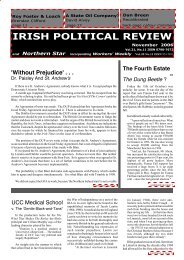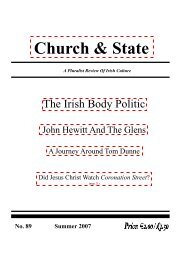Irish Political Review, March 2006 - Athol Books
Irish Political Review, March 2006 - Athol Books
Irish Political Review, March 2006 - Athol Books
Create successful ePaper yourself
Turn your PDF publications into a flip-book with our unique Google optimized e-Paper software.
Indeed anti-imperialism was the main<br />
reason for its existence. Markieviecz’s<br />
connection with Sinn Fein and the<br />
Volunteers was tenuous to say the least.<br />
Organising the youth of Ireland meant<br />
organizing outside of respectable nationalism<br />
and respectability in general, so she<br />
aligned herself with the Trade Union<br />
movement of Larkin and Connolly that<br />
was beginning to sweep the country—the<br />
Union movement of general workers in<br />
the cities and the countryside—the <strong>Irish</strong><br />
Transport and General Workers Union.<br />
So in the Rising, she was not with the<br />
Volunteers but was second-in-command<br />
to Michael Mallin, the Commander of the<br />
<strong>Irish</strong> Citizen Army—the army of the Transport<br />
Union. Mallin was also executed by<br />
the British.<br />
This connection meant that the<br />
Fianna’s roots were far more in the<br />
working class than other elements of the<br />
nationalist movement, This remained the<br />
case right through the organisation’s<br />
existence.<br />
(A brief word here on the 1916 Rising<br />
itself. It is portrayed as a "glorious<br />
sacrifice" by a gallant few. Holding Dublin<br />
for a week against the greatest army in the<br />
world was no mean feat. But it was more<br />
than that. The Volunteers in North Dublin<br />
swept all before them. DeValera’s battalion<br />
on South side of the city dominated the<br />
battle throughout. The vulnerable<br />
headquarters at the GPO was successfully<br />
evacuated. There is no reason to think that<br />
the Rising could not have lasted several<br />
weeks, and if it had done so, the country<br />
units which were stood down on Easter<br />
Sunday would have come into play. I<br />
know for sure that the Volunteers in Kerry,<br />
Cork and Limerick were waiting for news<br />
from Dublin to rise up, and assume that<br />
the situation was the same in other areas.<br />
Pearse decided to surrender on purely<br />
humanitarian grounds as the British Navy<br />
began to pulverize the centre of Dublin. If<br />
one wants to look for comparisons, how<br />
long did the British Army hold out in<br />
France in 1940 before breaking and<br />
running to Dunkirk and leaving its French<br />
allies in the lurch? And when a small<br />
Japanese force attacked Singapore some<br />
time later, the much superior British force<br />
did not fight at all!)<br />
I first saw the Fianna as a child of<br />
about five years old when the King’s<br />
Bridge in Dublin was renamed after Sean<br />
Heuston. (The nearby railway station was<br />
later similarly renamed.) A cousin of<br />
mine from Cork was in charge of the event<br />
at the head of boys in green tunics and<br />
slouch hats.<br />
By the age of eight I was a member. I<br />
can remember being taught the basics of<br />
4<br />
history, the code of honour and scouting<br />
essentials by a man called Henry Gough.<br />
I realized years later that this "man" was<br />
all of fifteen years old. And that was one<br />
of the things that distinguished the Fianna<br />
from other scouting organizations. It was<br />
an organization for boys led by boys. (It<br />
later became open to girls as well.)<br />
It pledged its allegiance to the Army<br />
Council of the IRA but only in that body’s<br />
capacity as the inheritor of the Second<br />
Dail Eireann and in no other capacity.<br />
Occasionally the IRA tried to impose its<br />
passing will or whim on the Fianna,<br />
especially in the period when Desmond<br />
Greaves was attempting to control the<br />
Republican Movement. Such interference<br />
was always resisted, often after a few<br />
bloody noses were suffered. On their<br />
side.<br />
The Fianna also continued to take its<br />
members from the working class youth.<br />
The big <strong>Irish</strong> scouting movement was the<br />
Catholic Boy Scouts of Iteland and was<br />
dead respectable. It wouldn’t have touched<br />
our type of member with a bargepole.<br />
The Baden Powell scouts also continued<br />
to exist (and may still do for all I<br />
know).They were called the Boy Scouts<br />
of Ireland and kept alive a pro-British<br />
spirit among the small Anglo-<strong>Irish</strong> community.<br />
It would be interesting to know<br />
how many of those involved in the Reform<br />
Movement and the Orange Order of recent<br />
times came through this organization.<br />
The Fianna took seriously its tasks of<br />
recruiting working class boys, giving them<br />
some kind of discipline, teaching them<br />
self-reliance, and letting them know their<br />
history. It had a high turnover and was not<br />
a recruiting ground for the IRA—as was<br />
often suggested. Of the hundreds of boys<br />
who were in the Fianna with me, I can<br />
think of only five or six who joined the<br />
IRA—excluding those like myself who<br />
came from Republican families.<br />
Even its officers, most of us leaving at<br />
16 or 17, did not go into the IRA or have<br />
any further connection with the Republican<br />
Movement. And many "respectable"<br />
Republicans wouldn’t let their sons within<br />
a mile of the scruffs that made up the<br />
Fianna.<br />
(All this applies to the 26-Counties. In<br />
the North, the Fianna was an illegal<br />
organization and I know very little about<br />
it there.)<br />
I left the Fianna when I was 17, and<br />
though I’ve seen the uniforms from time<br />
to time over the years, I don’t know what<br />
has happened to it. I hope it has survived.<br />
It is needed today every bit as much as<br />
when Countess Markieviecz formed it in<br />
1909.<br />
Conor Lynch<br />
BOOK LAUNCHES<br />
sponsored by<br />
Aubane Historical Society<br />
Aubane, Millstreet, Co. Cork<br />
Friday, 24th <strong>March</strong> 8.00 pm<br />
TEACHERS CLUB, 36 PARNELL SQUARE, DUBLIN<br />
Launch by Prof. David Miller; Chair: Danny Morrison<br />
The Origins & Organisation of British Propaganda In Ireland 1920<br />
by Brian P Murphy OSB<br />
Friday, 7 April 7.30pm<br />
TEACHERS CLUB, 36 PARNELL SQUARE, DUBLIN<br />
Conversations with Carlyle by Charles Gavan Duffy.<br />
Reprint of the 1892 edition with introduction: Stray thoughts on<br />
Young Ireland by Brendan Clifford<br />
Good Friday, 14th April 11.30 am<br />
GREEN CROSS BOOKSHOP, 51-55 FALLS RD., BELFAST<br />
Six Days of the <strong>Irish</strong> Republic (1916) and other items<br />
by L G Redmond-Howard. Introduction by Brendan Clifford<br />
Saturday, 29th April 3.30 pm<br />
CORK CITY LIBRARY, GRAND PARADE, CORK<br />
The Origins & Organisation of British Propaganda In Ireland 1920<br />
by Brian P Murphy OSB<br />
&<br />
Florence and Josephine O'Donoghue's War of Independence<br />
by John Miller Borgonovo<br />
All Welcome<br />
jacklaneaubane@hotmail.com




